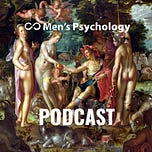Welcome to a series of videos that will introduce you to a simple model of men’s psychology that draws on some of the growing body of research on men.
There’s more than meets the eye with men, just as there is with women. Men are driven at the core by instincts the same as women—masculine instincts.
However, just like women, they have emotions of very similar types and style. The expression is different because emoting is in some part, governed by the instincts.
Finally, the intellect and mature executive functions are also just like those of women (we have identical IQ potential - and “EQ” potential.) Yet the masculine instincts also influence that, and our communication and behavior.
This synthesis of the old and new, the rigorous and the elegant, and most important of all, an attempt at “unification of the psychologies” is the aim of Masculine Psychology, as we start to discuss in this first video.
It’s Masculine Psychology (originally, MMP), which is available in videos delivered one day at a time, for the full 5+ hours of the course (available to paid subscribers only)…
Upgraded Members get full access to the full program and many others from Men’s Psychology right away without waiting for lesson-by-lesson:
SUMMARY:
Dr Paul explores the relationship between spiritual traditions, psychological maturity, and character development, emphasizing the use of storytelling within major religions as a means of instruction. Key points include:
1. **Character Instruction in Religions**: The speaker posits that the world's major religions serve as guides for character development, using stories and parables instead of straightforward instructions. This narrative approach is preferred because it resonates more deeply with psychological growth.
2. **Symbolism in Religious Narratives**: Using the example of the Garden of Eden, the speaker questions the notion that knowledge is inherently bad. They interpret the story as a metaphor for the transition from childhood ignorance (representing bliss and lack of responsibility) to adult awareness of life's complexities, including the necessity of work and the duality of good and evil in the world.
3. **Spiritual and Psychological Growth**: The speaker connects spiritual maturity with psychological maturity, noting that the term "psyche," used in psychology, is synonymous with soul or spirit. They emphasize that psychological development parallels spiritual growth, suggesting that understanding oneself is essential for spiritual enlightenment.
4. **Cautions Against Literal Interpretations**: The speaker warns that interpreting religious stories too literally can lead to misunderstandings, advocating for a more symbolic interpretation that recognizes their deeper meanings and lessons.
5. **Upcoming Topics**: The speaker notes a transition to discussing psychosocial development models, specifically Eric Erikson's stages of development, indicating a shift towards a more structured, left-brained analysis of maturation.
Overall, the discussion shifts between spiritual insights and psychological theories, highlighting how both realms contribute to a comprehensive understanding of human growth and character development.













Share this post